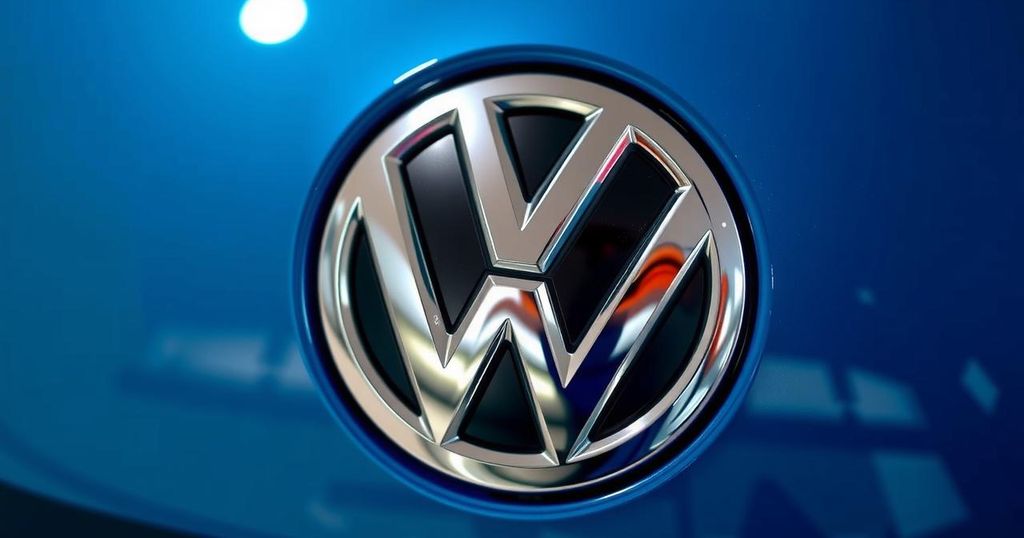Germany’s economy narrowly avoided recession with a 0.2% GDP growth in Q3, but faces a bleak outlook with the IMF forecasting zero growth for 2023. Volkswagen’s 21% profit drop signifies deeper issues in the auto industry, reflecting larger economic challenges including high labor costs and competition from China. Employment declines across sectors further underscore the need for urgent economic reform, though political obstacles complicate prospects for significant change.
Germany’s economic landscape resembles a ship navigating turbulent waters, struggling to keep afloat amid harsh storms. In a flicker of hope, Germany narrowly avoided recession, with the gross domestic product experiencing a slight uptick of 0.2% for the third quarter, primarily driven by buoyant government and household spending. But shadows loom large as the nation wrestles with a grim reality: the International Monetary Fund forecasts zero growth for 2023, marking Germany as the laggard among major economies. Volkswagen, the titan of German manufacturing, mirrors this economic malaise with its dramatic profit drop of 21% to €12.9 billion in the first nine months, a downturn exacerbated by slumping vehicle sales and fierce competitive pressure, particularly from Chinese electric vehicle brands. The stakes grow even higher, as Volkswagen contemplates potential factory closures and job cuts—possibly for the first time in its storied history. The discord within its operations became glaringly evident when chief financial officer Arno Antlitz emphasized the ‘urgent need for action,’ cautioning of ‘painful’ choices ahead. Further compounding Germany’s woes, a recent survey unveiled the steepest employment decline in the private sector in nearly four and a half years—not just at Volkswagen but across the manufacturing and services landscape. Business and consumer confidence have sunk to concerning lows, with a palpable sense of pessimism enveloping the nation. Marcel Fratzcher, president of Germany’s Institute for Economic Research, aptly described the situation as a pervasive ‘mental depression’—a sentiment that could prove to be one of the greatest obstacles to recovery. Volkswagen’s troubles are a microcosm of Germany’s broader struggles. The automotive sector, a cornerstone of the German economy accounting for around 5% of GDP and employing hundreds of thousands, is seeing its competitive edge dwindle. High labor costs, stagnant productivity, and the growing rivalry with China have all chipped away at its once-dominant position in the global market. A startling report warned that one-fifth of Germany’s industrial output could be at risk by 2030, pressured by energy costs and shifting demand dynamics. Calls for transformation echo throughout the nation, with experts advocating for an investment overhaul of around €1.4 trillion needed by 2030. However, aspirations for meaningful economic reform appear hindered by stringent borrowing constraints and a government plagued by indecision that leaves Germany adrift without a clear course toward renewal. While lower inflation may offer a glimmer of relief ahead, it’s suggested that not until after the expected 2026 elections will Germany’s fortunes revive. Currently, the prognosticators see a stagnating economy on the horizon, a stark reminder of how swiftly affluence can turn to adversity on the stage of global economics.
Germany’s economy is in a precarious state, as evidenced by the recent GDP figures that show only marginal growth. The narrative of decline is deepened by Volkswagen’s plummeting profits, highlighting vulnerabilities in one of the world’s strongest automotive nations. The interplay of local labor costs, shifts in global demand, and rising competition, particularly from burgeoning markets like China, casts a long shadow over Germany’s industrial landscape. The broader implications for employment and economic vitality accentuate the urgency for reform, underscored by forecasts of stagnant growth and a complex political backdrop that complicates decisive action.
In conclusion, Germany’s economy stands at a critical juncture, grappling with stagnation and uncertainty. Volkswagen’s struggles illustrate systemic issues in the automotive sector that reflect wider vulnerabilities in Germany’s economic fabric. The urgency for significant transformation is palpable, even as the political landscape remains fragmented and constraining. With the shadow of recession posing a constant threat, the path forward is fraught with challenges but also ripe with the potential for revitalization, if the necessary reforms can be instigated in time.
Original Source: www.cnn.com

Leave a Reply